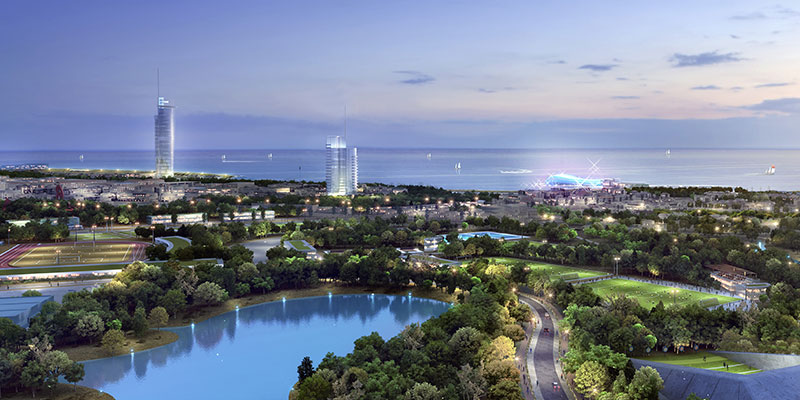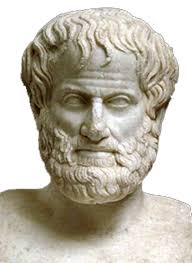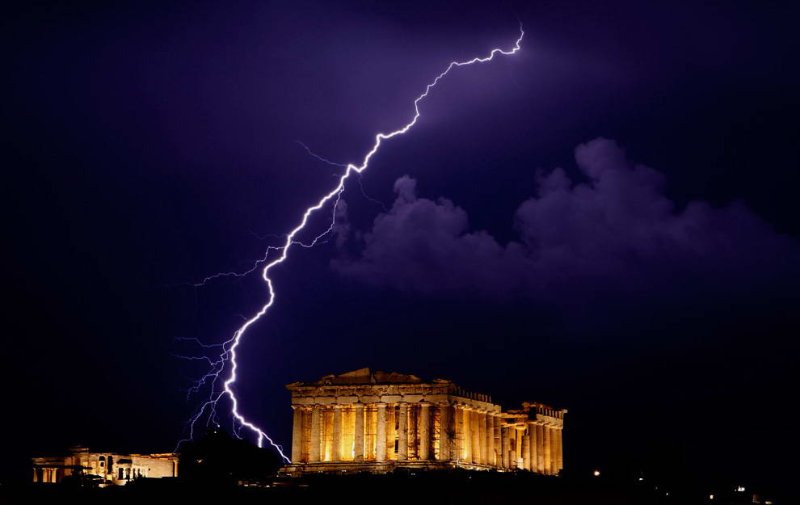
The Hellinikon. Social License to Operate!
A. The Hellinikon - A Great Title Attributed to a Great Development Program
A. The Hellinikon - A Great Title Attributed to a Great Development Program
For the non-native speakers ‘Hellas' means 'Greece' and 'Hellinikon’ means ‘Greek.’
Four years ago when the Greek State decided to launch the Hellinikon program, I had a memorable discussion with Angeliki, my mother in law, a wise old lady. During a family dinner, I was explaining to her the program scope and the engaging parties, when she suddenly interrupted me saying: “Look son, I don’t know the investment’s details, but I know Greek politicians. If you know the investors, tell them that this project will make them tired, tired, tired.” She paused for a moment, to continue: “They have to be brave, brave, brave.” Then she said “Goodnight” and left the table.
__________ . __________
The bill for the concession of the old Athens airport to a consortium led by Lamda Development SA was tabled by the government in Parliament on Thursday the 15th of September 2016. The ratification of the bill is one of the outstanding prior actions Greece must fulfill to receive the next sub tranche of 2.8 billion Euros in a bailout from international creditors.
Since I was closely observing the trajectory of the program all these years, I felt the need - as a Greek entrepreneur - to share some of my thoughts having emerged during the program’s tender period. After all, as Angeliki uses to say:
We can always start to have an interesting discussion after the decision has been made.
B. Wiser but Sadder
On Wednesday the 21st of September 2016, the Greek parliament approved the concession bill but the debate preceding the vote exposed divisions within the leftist-led coalition over the privatization project.
According to Kathimerini newspaper: "The bill, described as 'a compromise' by Finance Minister Euclid Tsakalotos, passed into law with the support of all parties in Parliament except neo-Nazi Golden Dawn and the Communists. Culture Minister Aristides Baltas used much stronger language, describing the concession of the plot at Elliniko as 'a defeat' on SYRIZA’s 'democratic road to socialism' and indicated that the coalition will shift stance on the project again. 'We want a different type of investment in Elliniko,' he said. Alternate Environment Minister Yiannis Tsironis struck a polemic tone too, noting that there 'is still concern' about Elliniko and calling on activists to 'to do their job."
I feel wiser
I feel wiser because I have learned something new. Until now I knew that most of the time
People make decisions based on emotions, and then justify their actions using logic.
 Now I have realized that Aristotle, whose discussion of appeals to logos (argument), pathos (emotion) and ethos (character) has influenced countless leaders, has not influenced at all some of the Greek politicians.
Now I have realized that Aristotle, whose discussion of appeals to logos (argument), pathos (emotion) and ethos (character) has influenced countless leaders, has not influenced at all some of the Greek politicians.
Where is the logic hidden under the argument “I voted for the investment, but I don’t support it”?
Where is the ethos and character hidden under the argument “I voted for the investment, but I call the activists to fight against it”?
And where is the emotion hidden under the total absence of a new vision for Athens?
And I feel sadder
I feel sadder when I’m thinking of the impact of government officials’ statements to the value of the investment.
And I feel sadder because the Greek leftist-led government coalition has not a clear answer to the question
To whom do we owe a duty?
Does the government owe a duty to Greece or do they owe a duty to lobbying groups of voters?
C. Value
As an entrepreneur and engineer I have learned three things:
First
The interests of stakeholders are intertwined and interdependent. Success ensues only when a virtuous circle between the value creation for employees, clients, society, owners and investors is produced. In a country’s context this circle can only begin with the entrepreneurs - value creation starts with them. The circle must not be broken at the expense of one group of stakeholders or another.
Success is when sustainable value for all stakeholders is created.
And this exactly was the approach of the Hellinikon program investors during the tender and negotiations period. They early enough recognized that the program could be successful only if value will be created for all the stakeholders. And this approach is so obvious in the program’s master plan with provisions such as the creation of Europe's biggest urban recreation park (500 acres) in the Elliniko⚹ plot, open to the city of Athens and the local communities. (*) Elliniko is the name of the plot where the Hellinikon program will be implemented.
Second
Infrastructure programs do not have an inherent value.
Value depends on who is leading the program and what strategy they pursue.
Investors’ management has implemented a strategy that focuses not only to market but also to non-market. Their non-market strategy and the corporate diplomacy skills they demonstrated during the negotiation period focused in all stakeholders and led to the final agreement with the Greek government.
Third
The value of a program has to do with the expectations of the program.
The Hellinikon program will create value only if the final outcome of the investment will provide the benefits to all stakeholders.
To all stakeholders: like the local communities, the city of Athens, the national economy, the program’s workforce, the contractors and vendors, the users, the residents and of course the investors.
Large infrastructures, since they are immediately and directly affecting people lives, are by definition complex programs. Our limited capacity to up-front control complex programs could lead to various judgments on program risks and consequently on program’s value.
Under this view it is sometimes useful to bring in sight a pre-mortem analysis. So one approach in judging the Hellinikon program’s value could be: What is the value-balance of the program, and another counterfactual approach could be: What is the value-balance if the program cancelled.
And this second approach is the one that I find very interesting for our political leaders:
- What will be the value impact in the national economy if the Hellinikon program cancelled?
- Are there any other alternatives?
D. The Elliniko Plot Valuation
 Does the Elliniko plot have a value without the investment? The answer is a plain No.
Does the Elliniko plot have a value without the investment? The answer is a plain No.
The value of Elliniko plot without the investment is near to Zero.
Some governmental officials though, claim that the value of the plot is significantly higher than the price the investors will pay to the Greek State. Their claim based on the idea that in the Athens Riviera neighborhood the market prices of the existing houses are high. Our political leaders (and sometimes real estate professionals) confuse asset pricing with valuation.
But value is not price. Value is finance not accounting. Value is a notion about the future, not the past.
Value is the expected free cash flows discounted at the opportunity cost of capital.
And the most important word in this definition of value is the word ‘the.’ It’s not about my expectations, or your expectations, or the minister’s expectations, or the investors’ expectations. It’s about the expectations with the probabilistic meaning of the word ‘the.’
E. The Winter of our Discontent

INSEAD economics professor Ilian Mihov has presented a usable framework that captures the essence of economic growth theory. According to his model, the four I’s of economic growth are:
Innovation: The incentives to innovate will drive up the productivity growth in the country (e.g. US, Germany).
Initial conditions: Provides the potential for ‘catching up’ (e.g. China today).
Investment: A key ingredient in the process of convergence is the building up of the capital stock. What drives investment: stability and institutions. Miracles are countries with investment of over 25% of GDP (e.g. Korea 35%).
Institutions: The best way to ensure sound macroeconomic policies and political stability is to build institutions that create incentives for stability (e.g. Independent Central Bank). There is no country that has become rich with poor-quality institutions.
The above framework provides the main elements of the strategy a country should develop and pursue. Unfortunately our political leaders have confused strategy with goals.
Growth is not strategy. Growth is the result of a strategy.
- So, what is our government’s strategy for large scale investments?
- What is our strategy for the Hellinikon program?
- And furthermore, if we have a strategy, do we have the ownership of this strategy?
- How could we fast turnaround the country?
- Could the Hellinikon program be a change agent?
I’d like these questions to be answered by our political leaders.
F. A Market Creating Innovation

Innovation is a novel match of a solution and need that creates value.
Under this view and considering Greece’s current situation, I prefer to see the Hellinikon program more as an innovation and less as an investment.
HBS professor Clayton Christensen’s work on the capitalists’ dilemma claims that there are barriers that blind political and business leaders to the best opportunities for creating new jobs and new markets. According to his work there are 3 kinds of innovation:
- Market creating innovations which create growth and more people have access.
- Sustaining innovations which help margins to improve.
- Efficiency innovations which free cash flows (money) toward the market creating innovations. This type of innovations eliminates jobs.
Greece has an immediate need for growth and the Hellinikon program is a market creating innovation.
G. The Investors - From Success to Significance
The investors. Who are they? Why have they pursued the Hellinikon program under such adverse conditions of the Greek economy? What is their strategy?
As I was observing the trajectory of the investment during the tender phase, I recognized three main challenges for the investors’ management team: Information asymmetry, time squeeze and social dynamics. And I was wondering what on earth motivated them to insist until the final agreement.
My initial approach was that they are motivated by the program itself. Investors’ vision for the development of the former Elliniko airport is the design of a pioneering development for Athens, with great emphasis on the creation of a world class metropolitan park, as well as the enhancement of the coastal front fully accessible to the public.
But is the above vision enough for an investor’s management team? And if we suppose that this is the case, what about the investor’s shareholders?
_________ . _________
Last Wednesday, when the Hellinikon bill approved by the Greek parliament, and during our family dinner, I initiated the same discussion we had four years ago. And it was Angeliki who asked me again who the investors are. When I answered her question her response was:
 “Look son, after the Second World War there was a generation of great Greek entrepreneurs who believed in Greece and transformed our country. They were not industrialists. They were nation-makers..." to be interrupted by our 5-year old son Davie who asked “Granny, what is a nation-maker?”
“Look son, after the Second World War there was a generation of great Greek entrepreneurs who believed in Greece and transformed our country. They were not industrialists. They were nation-makers..." to be interrupted by our 5-year old son Davie who asked “Granny, what is a nation-maker?”
Great entrepreneurs are not industrialists, they are nation-makers.
During that dinner, my mind shifted.
It shifted...
- ... from what business leaders Do (behaviors and skills), toward Who business leaders are (their values and their identity).
- ...from performance for the enterprise to progress for our society.
- ...from business leaders to business idealists.
- ...from Net Present Value to Net Future Value.
- ...from profit to profit and progress.
- ...from “explain to voters” to “a business is a force of good.”
A business is a force of good.
It shifted to “we need business to succeed, to take the taxes and pay for the schools and doctors.”
__________ . __________
And back to Hellinikon…
As Simon Sinek nicely puts it "Every organization knows What they do; some organizations know How they do what they do; but very few organizations can clearly articulate Why they do what they do."
Very few organizations can clearly articulate Why they do what they do.
The Hellinikon program team have started with the Why.
They have a reason why they get out of bed every morning.
They can clearly answer the question "Why should Hellinikon matter to anyone else?"
Their investment does not sell residences; it produces economic growth and high expectations for our country.
And that is why they have achieved their first goal:
The social license to operate.
From Angeliki... to yours truly,
Christos
Christos Rados is an executive leader in the professional engineering services industry. He is an entrepreneur, ambitious giver, designer, programmer, scrum fun, and value creation lover. He has studied engineering, design, business and finance. He has abductive reasoning and synthetic intelligence.
Tags: hellinikon, thoughts